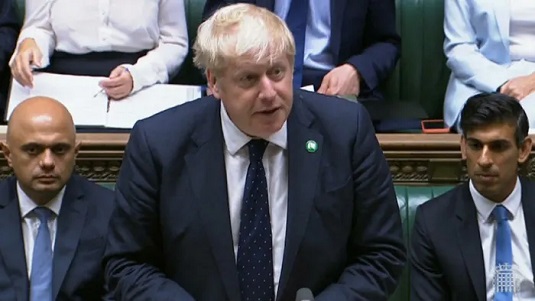
There are several reasons why this is risible. The first, most obvious fact is how workers are paying for this and those who don't pay National Insurance - the retired, landlords - are not. It doesn't take an eagle eye to draw inferences between the propensity to vote Tory and the government's happiness to shield certain groups from the costs of their policies. The second is how this is regressive in all sorts of ways. Businesses, for example, are having their contributions hiked as well but those under a certain size will either be exempt or have to pay it at a reduced rate. Protection for a sizeable proportion of the petit bourgeois, protection for another core group of Tory voters. The same courtesy however is not extended to wage earners, including small business staff, who are getting walloped with the flat rate. A mild inconvenience for someone pulling in £50k, but a big chunk out of the wage packet for the low paid. Who, readers will recall, are about to lose £20/week as Rishi Sunak chops down Universal Credit support. As a sop to "fairness", shareholders are facing a 1.25% levy on dividends.
Then there is the cap. In two years' time, a costs cap will be introduced ensuring personal care liabilities accrued over a lifetime will be capped at £86,000. This is also going to be tapered. Those with fewer than £20k in assets won't have to pay anything, and those upto £100k in assets will have to pay a reduced contribution. Undoudtedly we can expect to see the cap edge upwards over time in tune with property wealth, but this "progressive" measure, again, will hit the more modestly wealthy the hardest. With median house prices in England and Wales around £250k (for Wales it's £170k) as of December 2020, a lot of pensioners below the median - people of otherwise fairly modest means - are going to have a greater proportion of their estate eaten up than those in more expensive properties. It's a measure aimed at protecting the wealth of middle class and rich pensioners. The family of the retired stock broker will inherit a healthy chunk of their wealth because their former personal assistant, secretaries, and researchers are giving up a greater proportion of their assets. Obviously this gap becomes even starker if a couple go into care.
In short, forget the rubbish about the tax and spend Tories and the "you've got to hand it to them" plaudits. They've set up their proposed "rescue" of social care and the NHS in the most inequitable manner the party could get away with, shielding their important core constituencies while hoping poorer pensioners won't notice how they subsidise the rich. It's an abject lesson in how the concern for inequality and its perpetuation is at the heart of Tory policy.
At the press conference, Rishi Sunak defended the National Insurance increase by appealing to the instincts of Tory Britain: it was either do this, or borrow more money. A claim that is manifestly untrue. As the Evening Standard observed in May, the UK's 171 billionaires saw their wealth jump by £106.5bn - over a fifth - in the last year. There was no need to tax wage earners at all as a wealth tax of 12% on this tiny segment of the super rich would have more than covered the first year's costs. A bit less ambitious maybe, but Andy Burnham had his own cheaper alternative focused on taxing estates. Regressive, but nowhere near as regressive as the Tory bundle.
A couple more notes about the politics of this sorry announcement. This has clearly been done with an eye to the future. From April 2023 this will show up on payslips as a Health and Social Care Levy. Naming taxes and making them visible has long been a favoured right wing strategy to delegitimise public services and construct voters as taxpayers whose only interest in tax is to see it reduced. By signposting monies due to health and social care, it creates a query in the mind about where does the rest of tax paid go - a predisposition the Tories of the future will undoubtedly seek to exploit.
And the second, on the retired, the Tories had to noisily and publicly go after the working age people because of Sunak's desire to break the triple lock on pensions. As pensioners were in for a welcome and deserved increase to the basic pension of eight per cent this year, thanks to the rise in earnings following the Covid depression, Therese Coffey announced its suspension and a move to a rise determined by either inflation or 2.5%. She has said this will be for one year only, but given the constant rumours in the Tory press about the desire to do away with the triple lock, using the cover of an "exceptional year" and changes to social care is the way to do it.
In short, and with their characteristic instinct for divide and rule, the Tories have set about opposing the young to the old in a zero sum game of generational conflict - one they benefit from electorally - while ensuring the wellspring of all this, the system of class rule the Tories always put first, is secured against another potentially explosive challenge to its logics.
Image Credit
2 comments:
The government claim and you repeat that NI is "...going up by 1.25%...". Which is true, but it is in effect a 10% increase on what is the current NI rate. Yet another way the Tories and their friends in the MSM frame the story so as to portray the Tories in the best possible light in what for them is a massive and would normally be a disastrous U-turn.
Yes, important to recognise the difference between 1.25 percentage points increase and that that constitutes a 10% increase in NI.
Post a Comment